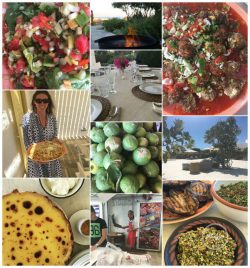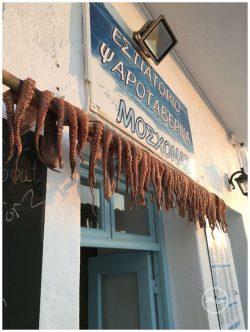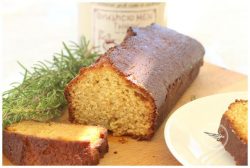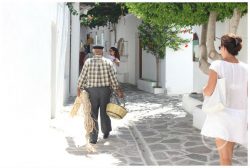 AS I write the rain is cascading down the conservatory window outside our office, so it seems like a good time to picture sun-baked, white painted Greek villages and the warm and mouthwatering flavours of the Mediterranean, evoked by Philippa Davis after two weeks working on the Greek island of Paros …
AS I write the rain is cascading down the conservatory window outside our office, so it seems like a good time to picture sun-baked, white painted Greek villages and the warm and mouthwatering flavours of the Mediterranean, evoked by Philippa Davis after two weeks working on the Greek island of Paros …
When most families pack a car and set off for their holidays it is not unusual for to go through last-minute panic checks.
“Did we turn off the lights?” “Did we pack my new bathing suit?” “Did we remember all the kids?”
So it was much to my amusement when we set off, with a car full of kids, bags, flippers and beach balls that Client One exclaims: “Stop the car! Did we remember the olive oil?!”
 It’s going to be my kind of trip, I thought as Client Two assures Client 1 that yes, all 17 litres of the stuff are on board and safety packed.
It’s going to be my kind of trip, I thought as Client Two assures Client 1 that yes, all 17 litres of the stuff are on board and safety packed.
Flicking through my photos of Paros, I am struck by several things: 1 – The brilliant white that gleams off every building (similar to my skin tone apparently the day I arrived); 2 – The amount of produce on Paros, from grapes to goats; 3 – The amount of Greek extra virgin olive oil we managed to go through (therefore meaning butter consumption alarmingly low); 4 – My new love for ouzo (but although it works phonemically well in the lingering heat of the Greek evening sun it’s quite the same in Dorset).
Ouzo is often drunk before dinner on ice with splashes of water. It works incredibly well with taramasalata and grilled octopus. The octopus are caught and killed, beaten to tenderise them and then left to dry in the sun. You can often see them draped over poles in the heat. Simply grilled with a splash of vinegar, lemon juice, parsley or dill and olive oil they make the most perfect aperitif.
Sea urchins are also very popular and can just be served simply with olive oil or, my new favourite way, scooped out and served on half a lemon. You gently scrape your spoon across, gathering up the sea urchin and getting a twang of lemon. Perfect.
When I arrived, there were half-hearted mutterings from some of the group that they would pile on a few pounds having read some of my heartier statistics earlier on this year. I think they were referring to the 1 ½ packs of butter, 500ml double cream and 5 eggs per person per day scenarios that occasionally seem to occur. Fear not, I said, as I was totally geared up and ready to start on summer-inspired salads, grills and healthier desserts and of course replacing as far as possible butter with Greek extra virgin olive oil.
 Menus involved baskets full of fresh local vegetables and fruits and local meats from our cheeky island senior butcher but unfortunately no fish as the sea was too rough due to the wind.
Menus involved baskets full of fresh local vegetables and fruits and local meats from our cheeky island senior butcher but unfortunately no fish as the sea was too rough due to the wind.
Food was kept light, refreshing and mostly healthy. With the lack of fish we kept meat dishes light by grilling or slow cooking with lots of herbs and light sauces. We tried to buy some goat – the island is scattered with them – but it looked rather scrawny. However the pork and 41-day aged beef was excellent.
Stand-out produce included the large capers which were plump and had a clean tang, olives from Kalamata which were of incredible quality, brilliant white feta, served from big barrels with chunks sliced off to order, and of course the olive oil.
It is only more recently that I have started using and loving Greek olive oil. My days at the River Café firmly swayed me to the beauty of a good Italian extra virgin olive oil.
You would not know from looking in the shops but Greece is the world’s third largest producer, but once you start looking into the murky and not quite so liquid green-gold world of it on a global scale you find there are many troubles, grey areas and mysteries. For instance, Italy sells far more Italian extra virgin olive oil than it can actually produce (they say that 60 per cent of Greek olive oil is shipped to Italy and sold as Italian).
 As a consumer it is another lesson of watching out who and where you buy from, reading labels and staying alert. It is worth knowing that the cheaper olive oils are often from trucks going around various farms/co-ops sucking up anything left in the barrel (so unknown age/ quality) then mixing and filtering before bottling and selling it on. Once you taste quality extra virgin olive oil it is hard to want to use anything else.
As a consumer it is another lesson of watching out who and where you buy from, reading labels and staying alert. It is worth knowing that the cheaper olive oils are often from trucks going around various farms/co-ops sucking up anything left in the barrel (so unknown age/ quality) then mixing and filtering before bottling and selling it on. Once you taste quality extra virgin olive oil it is hard to want to use anything else.
We had enough to bathe in but we managed to resist and keep it just for cooking – not only the obvious things like cooked meats, vegetables and making dressings but also in desserts and cakes.
Here is one of the cakes I made for afternoon tea. It uses olive oil rather than butter and mostly honey rather than sugar so seemed a good compromise for a treat.
This week’s statistics: Olive oil used, 6 litres; Greek yogurt eaten, 2.5 kilos; percentage of dishes involving olive oil, 91%; I’m loving properly made taramasalata and grilled octopus; every Greek villa should have caper berry bushes; Greek wine to try, Mayiko Bouvo, Magic Mountain, Nico Lazaridi
 Olive oil, orange, rosemary and honey cake
Olive oil, orange, rosemary and honey cake
1 long sprig of rosemary
150g s/r flour
½ tsp baking powder
150g cup ground almonds
3 eggs
100g sugar
75g runny honey
seeds from 1 vanilla pod
2 orange zest
Pre heat the oven to 170 ° C. Line a 2 lb loaf tin with baking parchment and place a sprig of rosemary at the bottom.
 In a bowl whisk together the flour, baking powder and ground almonds. In a separate bowl whisk together the sugar and eggs until pale and thick (about 3 minutes if using an electric whisk) then mix in the honey, vanilla seeds, orange zest and juice. Gradually mix the eggs into the flour mixture and stir until you have a smooth batter. Pour into the tin and bake on a lower shelf for 40 – 5omins or until a skewer comes out clean.
In a bowl whisk together the flour, baking powder and ground almonds. In a separate bowl whisk together the sugar and eggs until pale and thick (about 3 minutes if using an electric whisk) then mix in the honey, vanilla seeds, orange zest and juice. Gradually mix the eggs into the flour mixture and stir until you have a smooth batter. Pour into the tin and bake on a lower shelf for 40 – 5omins or until a skewer comes out clean.
Leave to cool for 10 minutes in the tin then turn out onto a rack to cool completely. Remove the rosemary sprig. Serve with spoonfuls of Greek yogurt.
Follow Philippa’s travels and find more recipes on her website www.philippadavis.com